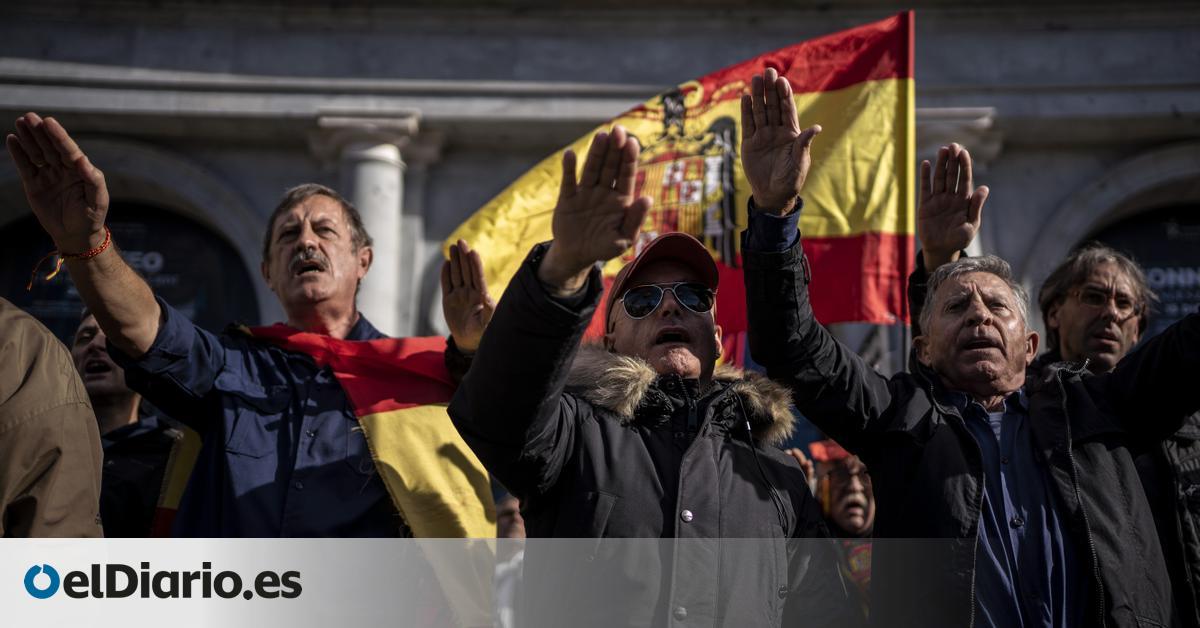
Considering the volume of punishments, one might say that in Spain, no one defends, claims or remembers the Franco dictatorship anymore. In almost two years of validity, only one sanction has been initiated, either for glorifying the military uprising, the dictatorship or its leaders or the other reasons contemplated by the 2022 Democratic Memory Law.
To date, only one disciplinary procedure has been opened. The one initiated on January 23, 2023 against the Falange Española for the tribute to José Antonio Primo de Rivera during a celebration in November 2022, according to data obtained by elDiario.es from the Secretary of State for Democratic Memory via the Transparency Law.
“And this case was opened because we started a fuss,” claims the president of the Association for the Recovery of Historical Memory (ARMH), Emilio Silva. That afternoon, “the police were able to observe how the people who were singing the national anthem [el Cara al sol] They stood with their right arms raised and extended in a fascist salute.” There were about 400 people.
You just have to stop by Franco’s tomb in Mingorrubio to see that it is a fascist altar. There is exaltation there to bore
Emilio Silva
— President of the Association for the Recovery of Historical Memory
The sanctions, as established by law, seek to “avoid the humiliation that any victim of the war or the Dictatorship could feel.” “What happens is that there is a lack of political will – analyzes Silva – because exaltations, in reality, are frequent.”
Masses, theatres, pyramids and tapestries…
In March of this year, at the celebration of the 90th anniversary of the merger between Falange and Jons, in a theater in Madrid the arms of the attendees were raised again in a fascist salute and the Falangist anthem was played. The Ministry of Territorial Policy and Democratic Memory later reported that it would review whether the act “violated the dignity of the victims.”
In February 2024, the Junta of Castilla y León declared a fascist monument a cultural asset of interest (BIC): the pyramid of the Italians built in the port of Escudo (Burgos) to bury the soldiers sent by Benito Mussolini to support the military coup. “It constitutes a unique asset within the cultural heritage of Castilla y León, due to its design and aesthetic, architectural and landscape values,” the Junta justified.
In October 2023, during the swearing-in ceremony of the Princess of Asturias at the Military Academy of Zaragoza, a commemorative tapestry could be seen remembering Francisco Franco (who was director of the centre). A protest by the ARMH led to the tapestry being removed, but there is no trace of it in the file.
In fact, the Historical Memory law is still a pending matter in the Ministry of Defense to fully apply the rule that prohibits exalting the dictatorship and seeks to compensate the victims.
Also weeks after the law was passed, during the first mass in homage to Francisco Franco after the law came into force, raised arms, the usual chants and a chorus of voices repeating: “Franco, Franco, Franco” could be seen after the religious ceremony. The then Ministry of the Presidency requested images and reports from the Government delegations of the demonstrations around 20N in November 2022 in order to examine whether the new law was violated.
“You just have to go by Franco’s tomb in Mingorrubio to see that it is a fascist altar. There is exaltation there to bore. Just like the 20N, on April 1 in the Valley or on July 18 when the Spanish Catholic Movement caused trouble,” adds Silva. “The issue is that the law is very non-specific. It is clear that there was no will to sanction when drafting the law. Lack of definition is a problem.”
Since this is not only a controversial issue, but also a controversial one in our country, we enter the realm of political will.
Alicia Cardenas Cordon
— Professor of Constitutional Law at the University of Córdoba
For her part, Alicia Cárdenas Cordón, professor of Constitutional Law at the University of Córdoba, agrees with the aspect of will, but not so much with the more technical part: “Since this is not only a controversial subject but also one that is so polemical in our country, we are entering the realm of political will,” she says.
But at the same time, the researcher maintains that “it is not a question of technical complexity or legislative vagueness.” In fact, she adds, “the sanctioning regime is not one of the weak points of the law.” However, Cárdenas Cordón understands that “if you grant jurisdiction to administrative entities that, by nature, are dependent on the executives, that can make the law ineffective.”
Governments headed by parties “that deny the importance of these laws will not initiate any investigation. Those that are more receptive will do a little more in this direction,” reflects the academic.
“The State Secretariat for Memory should be more courageous when it comes to applying sanctions to those who carry out acts of exaltation, or freezing subsidies to municipalities that maintain Francoist symbols in their territory,” says lawyer Eduardo Ranz, who handled the case of the exhumation of the Lapeña brothers from the Cuelgamuros Valley.
And he points out that resistance has also been revealed when applying the rule to the surnames of towns founded by the regime’s colonization plans, despite the fact that the law contemplates the elimination of place names with references to the dictator.
“I refuse to think that the low number of files is due to a local electoral cause, and that the reason is the lack of personnel and the heavy workload of the organization,” Ranz concludes.
I refuse to believe that the low number of files is due to a local electoral cause and that the reason is the lack of personnel and the heavy workload.
Eduardo Ranz
— memorial lawyer
Alicia Cárdenas Cordón recalls that the power to impose a punishment under this law – and the regional laws of the same nature – “belongs to the administration and not to the criminal jurisdiction; that is, to the judges, because violations of these laws are not crimes.”
“Imagine what would happen if the things that are said or done with the victims of Francoism were done with the victims of terrorism. That’s where there is no nuance,” argues Silva, who returns to the idea of the administrations’ willingness to enforce the norm. “Can we imagine what would happen if someone ripped up the photo of a victim of terrorism in a regional parliament?” he asks, referring to the president of the Balearic chamber, Gabriel Le Senne. “It is not a matter of taking it to the Prosecutor’s Office, which is fine, it is that the Ministry can sanction, that we have the law for something.”
Source: www.eldiario.es

